- Home
- Gillian Flynn
The Complete Gillian Flynn Page 84
The Complete Gillian Flynn Read online
Page 84
As I was leaving, Nash gave me the address of the friend Ann was going to visit the night she was grabbed. I drove there slowly over a perfectly squared few blocks. This west side was the newer section of town. You could tell because the grass was a brighter green, rolled out in prepaid patches just thirty summers ago. It wasn’t like the dark, stiff, prickly stuff that grew in front of my mother’s house. That grass made better whistles. You could split a blade in the middle, blow, and get a tweezy sound until your lips began to itch.
It would have taken Ann Nash only five minutes to pedal to her friend’s house. Add an extra ten in case she decided to take a longer route, stretch her legs at the first chance to really ride that summer. Nine is too old to be stuck pedaling in circles around the same block. What happened to the bike?
I rolled slowly past the home of Emily Stone. As the night bloomed blue, I could see a girl run past a bright window. I bet Emily’s parents tell their friends things like, “We hug her a little harder every night now.” I bet Emily wonders where Ann was taken to die.
I did. Yanking out twenty-some teeth, no matter how small, no matter how lifeless the subject, is a tough task. It’d have to be done in a special place, somewhere safe so a person could take a few minutes to breathe now and then.
I looked at Ann’s photo, the edges curling in as if to protect her. The defiant haircut and that grin reminded me of Natalie. I liked this girl, too. I tucked her picture away in my glove compartment. Then I lifted up the sleeve of my shirt and wrote her full name—Ann Marie Nash—in lush blue ballpoint on the inside of my arm.
I didn’t pull into anyone’s driveway to turn around as I needed to. I figured people here were jittery enough without unknown cars trolling around. Instead I turned left at the end of the block and took the long way to my mother’s house. I debated whether to phone her first and decided against it three blocks from home. It was too late to call, too much misguided courtesy. Once you’ve crossed state lines, you don’t phone to ask if you can drop in.
My mother’s massive house is at the southernmost point of Wind Gap, the wealthy section, if you can count approximately three square blocks of town as a section. She lives in—and I once did too—an elaborate Victorian replete with a widow’s walk, a wraparound veranda, a summer porch jutting toward the back, and a cupola arrowing out of the top. It’s full of cubbyholes and nooks, curiously circuitous. The Victorians, especially southern Victorians, needed a lot of room to stray away from each other, to duck tuberculosis and flu, to avoid rapacious lust, to wall themselves away from sticky emotions. Extra space is always good.
The house is at the very top of a very steep hill. In first gear, you can drive up the cracked old driveway to the top, where a carriage porch keeps cars from getting wet. Or you can park at the bottom of the hill and walk the sixty-three stairs to the top, clutching the cigar-thin rail to the left. When I was a child, I always walked the stairs up, ran the driveway down. I assumed the rail was on the left side going up because I’m left-handed, and someone thought I might like that. Odd to think I ever indulged in such presumptions.
I parked at the bottom, so as to seem less intrusive. Wet with sweat by the time I hit the top, I lifted up my hair, waved a hand at the back of my neck, flapped my shirt a few times. Vulgar pit stains on my French blue blouse. I smelled, as my mother would say, ripe.
I rang the doorbell, which had been a cat-calling screech when I was very young, now subdued and truncated, like the bing! you hear on children’s records when it’s time to turn the page. It was 9:15, just late enough that they might have gone to bed.
“Who is it, please?” My mother’s reedy voice behind the door.
“Hi, Momma. It’s Camille.” I tried to keep my voice even.
“Camille.” She opened the door and stood in the doorway, didn’t seem surprised, and didn’t offer a hug at all, not even the limp one I’d expected. “Is something the matter?”
“No, Momma, not at all. I’m in town on business.”
“Business. Business? Well, goodness, I’m sorry, sweetheart, come in, come in. The house is not up to par for a visitor, I’m afraid.”
The house was perfect, down to the dozens of cut tulips in vases at the entry hall. The air was so teasy with pollen, my eyes watered. Of course my mother didn’t ask me what kind of business could possibly land me here. She rarely asked questions of any potency. It was either an exaggerated concern for others’ privacy or she simply didn’t care much about much. I’ll let you guess which option I favored.
“Can I get you something to drink, Camille? Alan and I were just having amaretto sours.” She motioned to the glass in her hand. “I put just a little bit of Sprite in it, sharpens the sweet. But I also have mango juice, wine, and sweet tea, or ice water. Or soda water. Where are you staying?”
“Funny you ask that. I was hoping I could stay here. Just for a few days.”
A quick pause, her long fingernails, a transparent pink, clicked on her glass. “Well, I’m sure that’s fine. I wish you’d phoned. Just so I’d have known. I would have had dinner for you or something. Come say hello to Alan. We’re on the back porch.”
She began walking away from me, down the hallway—luminous white living rooms and sitting rooms and reading rooms blooming out on all sides—and I studied her. It was the first time we’d seen each other in almost a year. My hair was a different color—brown from red—but she didn’t seem to notice. She looked exactly the same, though, not much older than I am now, although she’s in her late forties. Glowing pale skin, with long blonde hair and pale blue eyes. She was like a girl’s very best doll, the kind you don’t play with. She was wearing a long, pink cotton dress with little white slippers. She was twirling her amaretto sour without spilling a drop.
“Alan, Camille’s here.” She disappeared into the back kitchen (the smaller of two) and I heard her crack a metal ice tray.
“Who?”
I peeked around the corner, offered up a smile. “Camille. I’m so sorry to drop in like this.”
You’d think a lovely thing like my mother was born to be with a big ex-football star. She would have looked just right with a burly, mustached giant. Alan was, if anything, thinner than my mother, with cheekbones that jutted out of his face so high and sharp his eyes turned to almond slivers. I wanted to administer an IV when I saw him. He overdressed always, even for an evening of sweet drinks with my mother. Now he sat, needly legs jutting out of white safari shorts, with a baby blue sweater draped over a crisp oxford. He sweated not at all. Alan is the opposite of moist.
“Camille. It’s a pleasure. A real pleasure,” he murmured in his monotone drawl. “All the way down in Wind Gap. Thought you had a moratorium on anything south of Illinois.”
“Just working, actually.”
“Work.” He smiled. It was the closest to a question as I would get. My mother reappeared, her hair now pulled up in a pale blue bow, Wendy Darling all grown up. She pressed a chilled glass of fizzing amaretto into my hand, patted my shoulder twice, and sat away from me, next to Alan.
“Those little girls, Ann Nash and Natalie Keene,” I prompted. “I’m covering it for my paper.”
“Oh, Camille.” My mother hushed me, looking away. When my mother is piqued, she has a peculiar tell: She pulls at her eyelashes. Sometimes they come out. During some particularly difficult years when I was a child, she had no lashes at all, and her eyes were a constant gluey pink, vulnerable as a lab rabbit’s. In winter time, they leaked streaks of tears whenever she went outdoors. Which wasn’t often.
“It’s my assignment.”
“Goodness, what an assignment,” she said, her fingers hovering near her eyes. She scratched the skin just below and put her hand in her lap. “Aren’t those parents having a difficult enough time without you coming here to copy it all down and spread it to the world? ‘Wind Gap Murders Its Children’!—is that what you want people to think?”
“A little girl has been killed, and another is missing. It�
�s my job to let people know, yes.”
“I knew those children, Camille. I’m having a very hard time, as you can imagine. Dead little girls. Who would do that?”
I took a slug of my drink. Granules of sugar stuck to my tongue. I was not ready to speak with my mother. My skin hummed.
“I won’t stay long. Truly.”
Alan refolded the cuffs of his sweater, smoothed his hand down the crease of his shorts. His contribution to our conversations generally came in the form of adjustments: a collar tucked in, a leg recrossed.
“I just can’t have that kind of talk around me,” my mother said. “About hurt children. Just don’t tell me what you’re doing, don’t talk about anything you know. I’ll pretend you’re here for summer break.” She traced the braided wicker of Alan’s chair with her fingertip.
“How’s Amma?” I asked to change the subject.
“Amma?” My mother looked alarmed, as if she suddenly remembered she’d left her child somewhere. “She’s fine, she’s upstairs asleep. Why do you ask?”
I knew from the footsteps I heard scampering up and down the second floor—from the playroom to the sewing room to the hall window that gave the best spying vantage of the back porch—that Amma was certainly not asleep, but I didn’t begrudge her avoiding me.
“Just being polite, Momma. We do that up north, too.” I smiled to show I was teasing her, but she buried her face into her drink. Came back up pink and resolute.
“Stay as long as you want, Camille, really,” she said. “But you will have to be kind to your sister. Those girls were her schoolmates.”
“I look forward to getting to know her,” I mumbled. “I’m very sorry for her loss.” The last words I couldn’t resist, but my mother didn’t notice their bitter spin.
“I’ll give you the bedroom next to the sitting room. Your old bedroom. It has a tub. I’ll buy fresh fruit and some toothpaste. And steaks. Do you eat steak?”
Four hours of threadbare sleep, like lying in a bathtub with your ears half submerged. Shooting up in bed every twenty minutes, my heart pounding so hard I wondered if it was the beating that woke me. I dreamt I was packing for a trip, then realized I’d laid out all the wrong clothes, sweaters for a summer vacation. I dreamt I’d filed the wrong story for Curry before I left: Instead of the item on miserable Tammy Davis and her four locked-up children, we’d run a puff piece about skin care.
I dreamt my mother was slicing an apple onto thick cuts of meat and feeding it to me, slowly and sweetly, because I was dying.
Just after 5 a.m. I finally threw off the covers. I washed Ann’s name off my arm, but somehow, between dressing, brushing my hair, and dabbing on some lipstick, I’d written Natalie Keene in its place. I decided to leave it for luck. Outside, the sun was just rising but my car handle was already hot. My face felt numb from lack of sleep and I stretched my eyes and mouth wide, like a B-movie scream queen. The search party was set to reconvene at 6 a.m. for continued work in the woods; I wanted to catch a quote from Vickery before the day began. Staking out the police station seemed a good bet.
Main Street looked vacant at first, but as I got out of my car I could see two people a few blocks down. It was a scene that made no sense. An older woman was sitting in the middle of the sidewalk, legs splayed, staring at the side of a building, while a man was stooped over her. The woman was shaking her head manically, like a child refusing to feed. Her legs shot out at angles that had to hurt her. A bad fall? Heart attack, maybe. I walked briskly toward them and could hear their staccato murmuring.
The man, white hair and ruined face, looked up at me with milky eyes. “Get the police,” he said. His voice came out crumpled. “And call an ambulance.”
“What’s wrong?” I started, but then I saw it.
Wedged in the foot-wide space between the hardware store and the beauty parlor was a tiny body, aimed out at the sidewalk. As if she were just sitting and waiting for us, brown eyes wide open. I recognized the wild curls. But the grin was gone. Natalie Keene’s lips caved in around her gums in a small circle. She looked like a plastic baby doll, the kind with a built-in hole for bottle feedings. Natalie had no teeth now.
The blood hit my face fast, and a shimmer of sweat quickly covered my skin. My legs and arms went slack, and for a second I thought I might smack the ground right next to the woman, who was now quietly praying. I backed up, leaned against a parked car, and put my fingers to my neck, willing my thumping pulse to slow. My eyes picked up images in meaningless flashes: The grimy rubber tip of the old man’s cane. A pink mole on the back of the woman’s neck. The Band-Aid on Natalie Keene’s knee. I could feel her name glowing hotly under my shirtsleeve.
Then more voices, and Chief Vickery was running toward us with a man.
“Goddammit,” Vickery grunted when he saw her. “Goddammit. Jesus.” He put his face against the brick of the beauty parlor, and breathed hard. The second man, about my age, stooped next to Natalie. A loop of bruised purple circled her neck, and he pressed his fingers just above it to check for a pulse. A stalling tactic while he gathered his composure—the child was clearly dead. Big-shot detective from Kansas City, I guessed, the smug kid.
He was good, though, coaxing the woman out of her prayers and into a calm story of the discovery. The two were husband and wife, the owners of the diner whose name I couldn’t remember the day before. Broussard. They were on their way to open for breakfast when they found her. They’d been there maybe five minutes before I came along.
A uniformed officer arrived, pulled his hands over his face when he saw what he’d been called for.
“Folks, we’re going to need you to head to the station with the officer here so we can get some statements,” Kansas City said. “Bill.” His voice had a parental sternness to it. Vickery was kneeling by the body, motionless. His lips moved as if he might be praying, too. His name had to be repeated twice before he snapped back.
“I hear you, Richard. Be human for a second.” Bill Vickery put his arms around Mrs. Broussard and murmured to her until she patted his hand.
I sat in a room the color of egg yolk for two hours while the officer got my story down. The whole time I was thinking about Natalie going to autopsy, and how I would like to sneak in and put a fresh Band-Aid on her knee.
Chapter Three
My mother was wearing blue to the funeral. Black was hopeless and any other color was indecent. She also wore blue to Marian’s funeral, and so did Marian. She was astonished I didn’t remember this. I remembered Marian being buried in a pale pink dress. This was no surprise. My mother and I generally differ on all things concerning my dead sister.
The morning of the service Adora clicked in and out of rooms on her heels, here spraying perfume, there fastening an earring. I watched and drank hot black coffee with a burnt tongue.
“I don’t know them well,” she was saying. “They really kept to themselves. But I feel all the community should support them. Natalie was such a darling. People were so kind to me when …” Wistful downward glance. It may have been genuine.
I had been in Wind Gap five days and Amma was still an unseen presence. My mother didn’t mention her. I’d also failed so far to get a quote from the Keenes. Nor had I gotten permission from the family to attend the funeral, but Curry wanted that coverage more than I’d ever heard him want anything, and I wanted to prove I could handle this. I figured the Keenes would never find out. No one reads our paper.
Murmured greetings and perfumed hugs at Our Lady of Sorrows, a few women nodding politely at me after they cooed over my mother (so brave of Adora to come) and shoved down to make room for her. Our Lady of Sorrows is a shiny ’70s Catholic church: bronzy-gold and bejeweled, like a dime-store ring. Wind Gap is a tiny holdout of Catholicism in a region of booming Southern Baptists, the town having been founded by a pack of Irish. All the McMahons and Malones landed in New York during the Potato Famine, got generously abused, and (if they were smart) headed west. The French already reigned in St. Lo
uis, so they turned south and started their own towns. But they were unceremoniously pushed out years later during Reconstruction. Missouri, always a conflicted place, was trying to shed its southern roots, reinvent itself as a proper nonslave state, and the embarrassing Irish were swept out with other undesirables. They left their religion behind.
Ten minutes till the service, and a line was forming to gain entry to the church. I surveyed the crowded seat holders inside. Something was wrong. There was not one child in the church. No boys in dark trousers, rolling trucks over their mothers’ legs, no girls cradling rag dolls. Not a face younger than fifteen. I didn’t know if it was out of respect for the parents, or fear-driven defense. An instinct to prevent one’s children from being picked as future prey. I pictured hundreds of Wind Gap sons and daughters tucked away in dark den rooms, sucking the backs of their hands while they watched TV and remained unmarked.
Without kids to tend to, the churchgoers seemed static, like paperboard cutouts holding the places of real people. In the back, I could see Bob Nash in a dark suit. Still no wife. He nodded at me, then frowned.
The organ pipes exhaled the muffled tones of “Be Not Afraid,” and Natalie Keene’s family, until then crying, and hugging, and fussing near the door like one massive failing heart, filed tightly together. Only two men were needed to carry the shiny white coffin. Any more and they would have been bumping into each other.
Natalie’s mother and father led the procession. She was three inches taller than he, a large, warm-looking woman with sandy hair held back with a headband. She had an open face, the kind that would prompt strangers to ask for directions or the time. Mr. Keene was small and thin, with a round child’s face made rounder by wire spectacles that looked like two gold bike wheels. Behind them walked a beautiful boy of eighteen or nineteen, his brunette head bowed into his chest, sobbing. Natalie’s brother, a woman whispered behind me.

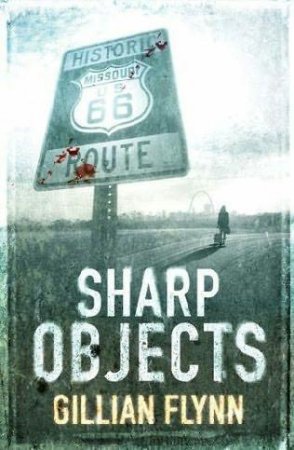 Sharp Objects
Sharp Objects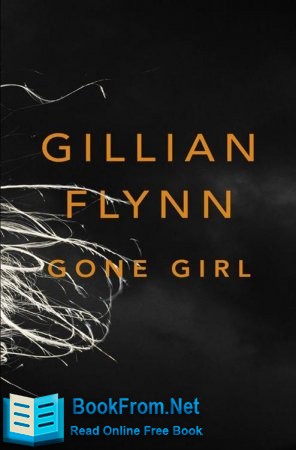 Gone Girl
Gone Girl Dark Places
Dark Places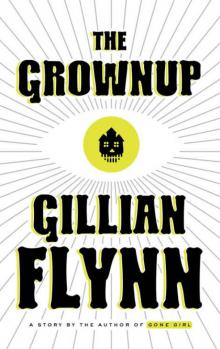 The Grownup
The Grownup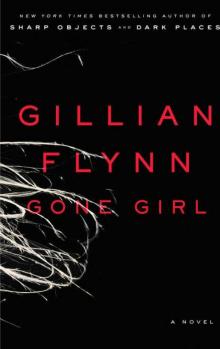 Gone Girl: A Novel
Gone Girl: A Novel The Complete Gillian Flynn
The Complete Gillian Flynn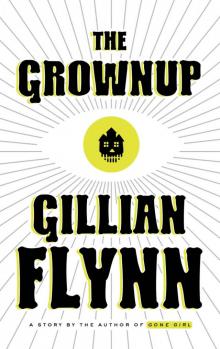 The Grownup: A Story by the Author of Gone Girl (Kindle Single)
The Grownup: A Story by the Author of Gone Girl (Kindle Single)